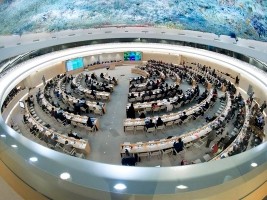|
||||||||||||||||||
| Download the revised decree and electoral calendar, published in the official journal |
|
|
Haiti - Politic : «current governance difficulties had to be addressed in a persistent manner» dixit Gustavo Gallón 24/03/2016 09:34:42
Wednesday in Geneva, the Council for Human Rights held, under the technical assistance and capacity building, an interactive dialogue with Gustavo Gallón, the Independent Expert in charge of the situation of human rights in Haiti. Presenting his report on Haiti, Mr. Gallón focused on the following issues : illiteracy, prolonged arbitrary detention, absence of elections, impunity for past crimes, and the situation of victims of natural disasters. He noted that the current governance difficulties in Haiti had to be addressed in a persistent manner and with concrete solutions. The rights of Haitian women had to be given priority since they were particularly vulnerable in the country. Haiti, speaking as the concerned country, stated that a number of measures had been initiated to hold elections, and to deal with pre-trial detention through the modification of laws. Regarding illiteracy, measures had been undertaken but the process was ongoing and it required resources. Other measures had been undertaken on strengthening the credibility of the judiciary and countering the problem of statelessness and registration of children. In the ensuing discussion speakers urged Haiti to work closely with the Independent Expert to implement recommendations, and emphasised the necessity of combatting pre-trial detention and impunity. There was a need to advance the rule of law and security in Haiti as better access to justice and strengthening o the prison system were key to bringing about progress. Haiti’s efforts to promote sustainable development and to eradicate cholera deserved greater support. Gustavo Gallón, Independent Expert on the situation of human rights in Haiti, focused his presentation on the following issues: illiteracy, prolonged arbitrary detention, absence of elections, impunity for past crimes, and the situation of victims of natural disasters. The new Government that had been formed in January 2015 had failed to organize elections on three occasions, the last one being in December 2015. The Government had established a National Commission for Electoral Evaluation which had found procedural irregularities and had called for a political dialogue and a technical examination of the electoral machinery. On 5 February 2016, the President of Haiti Michel Martelly and the Presidents of the Senate and the House of Representatives had signed an agreement, according to which Mr. Martelly’s mandate would end on 7 February 2016 and then the Parliament would choose an interim President for 120 days. The date for the elections had been set for 24 April 2016. The holding of credible elections was at the centre of common interest in Haiti, and it was key for upholding human rights, Mr. Gallón stressed. Turning to the issue of illiteracy, Mr. Gallón noted that the Government had not provided information concerning the ongoing literacy campaign. Almost half of the population was illiterate and at the current pace the illiteracy would not decrease in the next 20 years. The reduction of arbitrary prolonged detention was another issue that required serious attention, Mr. Gallón said. In March 2015 the Ministry of Justice had launched a campaign to enhance the work of judges, in cooperation with law students. However, the campaign had not brought about concrete results for the persons in detention, who comprised almost 72 per cent of the incarcerated population of Haiti. As for the situation of persons who were displaced in camps due to the earthquake and cyclones, 60,000 persons remained there. Regarding the persons of Haitian origin who had had to leave the Dominican Republic, Mr. Gallón explained that 2,500 persons had been distributed in five camps where they lived in precarious conditions and risked contracting diseases such cholera. He called on the authorities of Haiti to take urgent measures to provide access to persons deported from the Dominican Republic with access to health, education, food and drinking water. Regarding the victims of cholera, he insisted on the recommendation that a commission for truth, justice and reparation be formed in order to provide redress to more than 9,000 victims of cholera. Mr. Gallón noted that the current governance difficulties in Haiti had to be addressed in a persistent manner and with concrete solutions. The rights of Haitian women had to be given priority since they were particularly vulnerable in the country. Statement by the Concerned Country Haiti, speaking as the concerned country, said the Independent Expert had visited and observed the efforts deployed by the Government to promote and protect human rights in Haiti. A number of measures had been initiated, including on pre-trial detention, which was being dealt with by modifying the laws as well as providing alternatives. Regarding illiteracy, a number of measures had been undertaken but the process was ongoing, and required resources. After the postponement of the elections which had been due to take place on 24 January 2016, a political agreement had been signed between the executive and the legislative branches, resulting in a Provisional President, for a period of 120 days, whose mission was to name a Prime Minister by consensus, revitalise the provisional Electoral Council, and carry out the electoral process. Other measures had been undertaken on strengthening the credibility of the judiciary and countering the problem of statelessness and registration of children. Haiti thanked the Independent Exert for his solidarity with the Haitian people and the people of Haitian origin returning from the Dominican Republic, and for his petition to create the Truth, Justice and Reparations Commission. Interactive Dialogue European Union urged Haiti to work closely with the Independent Expert to implement recommendations, and emphasised the necessity of combatting pre-trial detention and impunity. Dominican Republic, speaking on behalf of the Community of Latin American and Caribbean States, spoke in favour of the electoral process, and urged various sectors to give privilege to dialogue, noting that the situation of human rights in Haiti was complex and had been worsened by the earthquake in 2010. Brazil, speaking on behalf of the Group of Friends of Haiti, reiterated the Group’s support for the mandate of the Independent Expert within the context of technical assistance and capacity building, and added that Haiti’s efforts to promote sustainable development deserved greater support. Spain thanked the Independent Expert for the report, which was far-reaching, and noted that it was only thanks to strong institutions with democratic legitimacy that threats facing Haiti could be dealt with. United States asked the Independent Expert to share some observations on prison conditions and elaborate on conditions in the migrant settlements along the country’s border, among other questions. Chile said that there was a need to advance the rule of law and security in Haiti, adding that better access to justice and strengthening of the prison system had to receive concerted efforts, also asking the Independent Expert for his suggestions for measures to reduce social inequality. Cuba reiterated that any discussion on Haiti had to recall the responsibility of the international community for the reconstruction and development of Haiti, as it had a heavy debt towards this country. All had an obligation to provide financial resources to Haiti. France encouraged Haiti to continue its cooperation with the Independent Expert on the promotion of human rights. France supported the five priorities highlighted by the Independent Expert, namely combatting social inequalities, improving conditions of detention, reinforcing the institutions, fighting against impunity, and addressing humanitarian needs. United Kingdom noted that the human rights situation was complex and that the five key challenges identified by the Independent Expert had hampered progress for decades. Strong political will by the Haitian Government, active engagement by civil society, together with continued engagement by the international community, were essential to effectively improve the situation. Morocco welcomed the initiatives of Haiti to combat hunger and malnutrition, which it aimed to eradicate by 2025. It also noted the initiatives undertaken by the Government in the areas of education and the rule of law, and was ready to share its experience on transitional justice. Brazil said 2015 was a decisive year in Haiti’s history. The success of the election process would be an essential step in the country’s institutional building and democratic consolidation. All efforts to support Haiti had to be made bearing in mind the main objectives of consolidating the rule of law and fighting against poverty. China welcomed the positive efforts on the political process, security and protecting human rights. It noted that the situation was still complex, and the restoration of peace and reconstruction still remained a battle. Underdevelopment was a root cause and the international community had an obligation in this respect. Venezuela said the terrible earthquake of 2010 had had dire consequences on over 3 million people. It called on the international community to support Haiti in its efforts to eradicate cholera. Solidarity and urgent measures were needed, without interference into the sovereignty and independence of Haiti. United Nations Watch was alarmed about the growing incidence of prolonged pre-trial detention, which affected more than 70 per cent of all detainees in Haiti, and was concerned about extreme social, political and economic inequalities. FIDH was concerned about continued impunity for the most serious crimes committed during the Duvalier dictatorships, military regimes and the Aristide Presidency, and called on Haiti to ensure the protection and physical integrity of human rights defenders. International Association of Democratic Lawyers said that cholera continued to ravage Haiti, and echoed calls to respect cholera victims’ right to an effective remedy. Human Rights Watch expressed concern about the lack of water and sanitation in schools, often exposing children to health hazards such as diarrhoea, worm infections and cholera. Concluding Remarks Haiti, speaking as the concerned country, said that it remained committed to the creation of the rule of law. The Independent Expert’s recommendations formed an important part of that, and Haiti also expressed a wish to build a society based on economic participation, among other factors, and wished to continue cooperating with all bodies in the United Nations system. Gustavo Gallón, Independent Expert on the situation of human rights in Haiti, said in response to questions on overcoming challenges through international efforts that there had been a lot of cooperation over the years with Haiti and a lot of political will had been shown, but cooperation generally had been somewhat scattered. If efforts of the involved parties could be joined together, results would be better. Regarding prison conditions, he said that unfortunate coincidences had reduced the positive perception of the Government’s recent initiatives on that matter. Regarding the conditions of migrants along the country’s borders with the Dominican Republic, he said it was a difficult situation for many people, which was related to both countries. The problem of documentation and nationality was one aspect of the problem. Legal solutions could resolve that problem, which also had economic aspects. A policy oriented toward providing basic services was needed. Regarding the electoral process, he said it was an uncertain situation and it was difficult to say what the Government could do. Regarding measures to offset social inequality, he mentioned the need to measure things of a structural nature, such as tax relief measures and the right to water. Reliable public services and housing were also of importance. He said it was not necessary to have a reform of the Constitution. Regarding improving the conditions of minors in prisons, he said that one problem seen very often in Haiti was a lack of time when the judges had to deal with decisions on whether or not to imprison or free someone. He expressed a wish for Member States to continue working with Haiti to strengthen human rights in the country. See also : https://www.haitilibre.com/en/news-16762-haiti-justice-conclusion-of-the-un-independent-expert.html https://www.haitilibre.com/en/news-16667-haiti-justice-monitoring-mission-of-gustavo-gallon.html HL/ HaitiLibre
|
|
|
Why HaitiLibre ? |
Contact us |
Français
Copyright © 2010 - 2026 Haitilibre.com |





